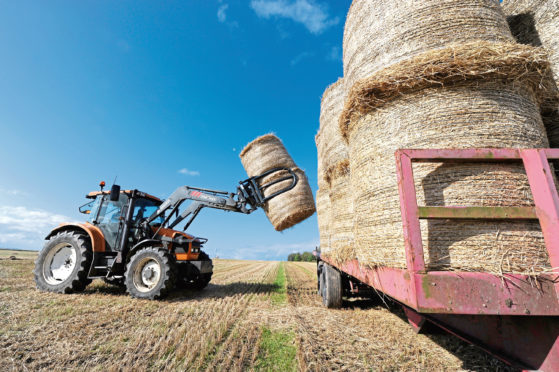Harvest 2018 progress reports from across Scotland confirm an impending shortage of straw despite more farmers choosing to bale, rather than chop.
According to NFU Scotland (NFUS), growers from across the country are reporting that both volumes of straw, and straw length, have decreased.
NFUS combinable crops committee chairman Ian Sands reported that winter barley and oilseed rape were cut with average yields achieved.
“We cut some spring barley last week which was better than expected, the quality was good, nitrogen levels high and yields of straw poor,” added Mr Sands.
“We also cut wheat last week. On light land, yields were disappointing but in heavy land, yields were quite good. However, straw yields were well below the norm.”
In Aberdeenshire, winter barley yields have ranged between 1.2 tonnes and 3.7 tonnes per acre, said NFUS regional manager for the north-east, Lorna Paterson.
She said: “Spring barley and winter wheats are ripening well. There have been concerns about few tillers with less plants from each seed, so potential for less of a yield when combined, but hopefully good bold grains.
“There are also concerns about secondary growth, but time will tell how this has gone. The crops from wheat and spring barley are certainly shorter so it is predicted that there will be less straw from both.”
Sandy Henderson of Little Ythsie, Tarves, Ellon, said winter barley harvest yielded less straw than normal, but the grain was “surprisingly decent”.
He said: “We will be starting winter wheat which we are expecting to be very short in terms of straw yield. This year we have baled oilseed rape straw to use ourselves but also sell to one or two people locally. We would normally chop rape straw.
“I think in our area this year more people are baling straw than normal, particularly oilseed rape straw. We also made hay from our set-aside land.”
Meanwhile Cameron MacIver of Wester Coltfield, Forres, said spring barley harvest in Moray had started 10 days early with moisture low at 15%, nitrogen higher at 1.6 and above-average screenings.
He said: “The straw yield is a lot better than expected with the grain yield back a good half tonne per acre. It’s a case for us that any good land that held moisture is yielding very well. However anything that suffered drought is rubbish.”
In East Lothian, Kelvin Pate said straw yields were well back on last year.
He said: “We have never baled wheat straw so dry – 6% – with baling 12 hours behind the combine. I have baled nearly twice the area to get enough straw to be sure not to run out compared with last year.”
Neil White from Berwickshire added: “Lots of farmers are swathing straw which would normally be chopped. Straw will remain at a premium price as the unprecedented demand will gobble up any extra out there.”
